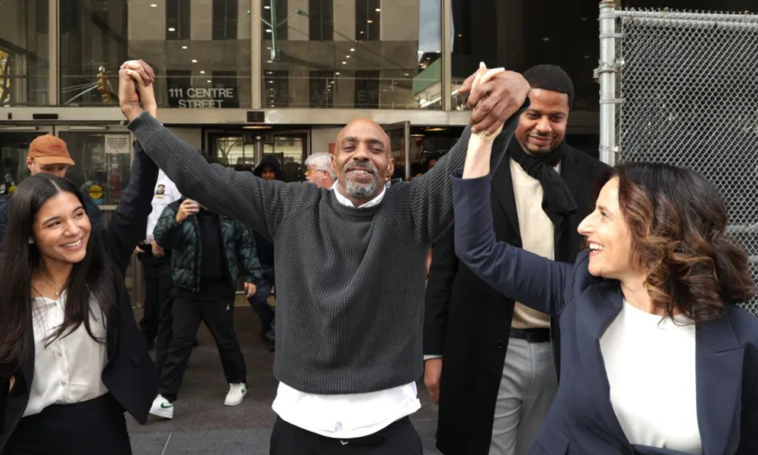Two men who served decades in prison for separate murders in New York City were exonerated on Monday after reinvestigations. In a monumental turn of events, Jabar Walker and Wayne Gardine, wrongfully convicted in separate decades-old Manhattan murder cases, were officially exonerated on Monday. Walker, who spent 25 years incarcerated, expressed his enduring faith, stating, “This whole time, 25 years of waiting — I never lost faith.” The Manhattan District Attorney’s Office, in collaboration with the Legal Aid Society and the Innocence Project, played a pivotal role in unveiling the miscarriages of justice.
Two men who served decades in prison for separate murders in New York City were exonerated on Monday after reinvestigations. He stated, “I’m happy that the justice system finally worked,” acknowledging his resilience throughout years of wrongful imprisonment.
Jabar Walker, convicted at the age of 20 for a double murder in Harlem in 1995, was released after the Manhattan DA’s office and the Innocence Project presented “newly discovered evidence” affecting witness testimony. The investigation also revealed Walker’s lack of effective legal representation, a constitutional shortcoming highlighted by Manhattan DA Alvin Bragg.
The elation outside the courtroom as Walker reunited with his family marked the end of a long and unjust incarceration.
Meanwhile, Wayne Gardine, serving 29 years for the 1994 murder of Robert Mickens, experienced a similar twist of fate. His 1996 conviction, primarily based on testimony from a single eyewitness, a local drug dealer, was called into question.
New evidence from a second witness contradicted the dealer’s account, emphasizing the unreliable nature of the trial. Manhattan DA Alvin Bragg condemned “unjust convictions” and expressed hope for Gardine’s rebuilding of life post his release.
Gardine, released on parole last year but facing potential deportation to Jamaica, extended gratitude to Legal Aid, DA Bragg, and investigators for their thorough and prompt handling of his case.
The exoneration of Walker and Gardine sheds light on the persistent flaws within the justice system and underscores the importance of continuous efforts to rectify wrongful convictions.
The emotional scenes of Walker’s release were mirrored by the acknowledgment of Gardine’s prolonged fight for justice. While both men are now free, their stories bring attention to the lasting impact of wrongful convictions. Walker’s mother, Patrice Walker, expressed overwhelming joy, stating, “My stomach is jumping like crazy. I can’t stop it, but to hold him out in the hall, then I will really know he’s home to stay.”
Terry Walker, Jabar’s stepfather, highlighted the irreplaceable moments that Jabar missed during his imprisonment, emphasizing the need for systemic change to prevent such injustices. As these men rebuild their lives, the question of compensating for lost time and opportunities looms large, pointing to broader conversations about the responsibility of the justice system in rectifying its errors.
As Jabar Walker and Wayne Gardine step into newfound freedom, their cases stand as testaments to the imperative of scrutinizing convictions and rectifying miscarriages of justice. The legal system’s acknowledgment of errors in these decades-old cases prompts reflection on the broader challenges within the justice system and the ongoing fight for a fair and just society.






GIPHY App Key not set. Please check settings
One Comment